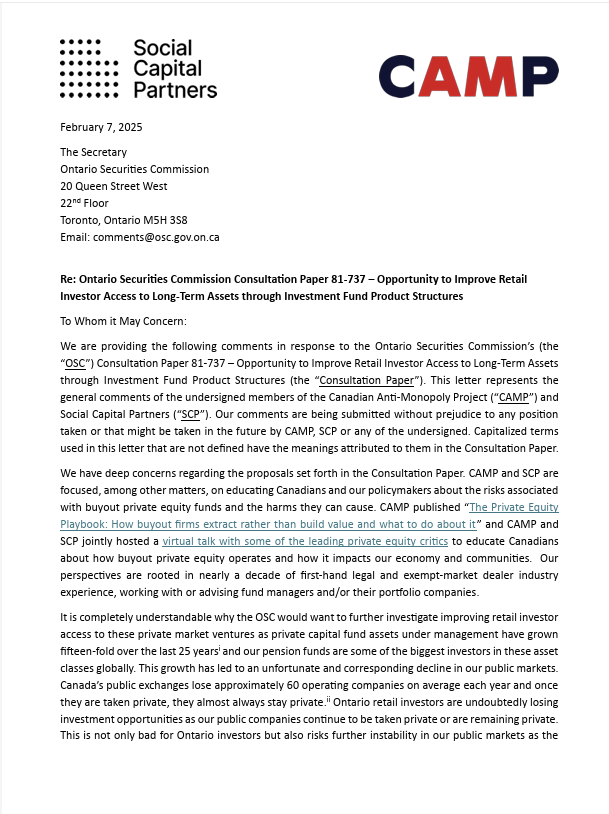On February 7, 2025, the Canadian Anti-Monopoly Project (“CAMP”) and Social Capital Partners (“SCP”) submitted a joint letter to the Ontario Securities Commission (“OSC”) in response to the OSC’s Consultation Paper 81-737 – Opportunity to Improve Retail Investor Access to Long-Term Assets through Investment Fund Product Structures. The comments detail deep concerns from CAMP and SCP regarding the proposals set forth in the Consultation Paper related to expanding access to private equity.
CAMP and SCP are focused, among other matters, on educating Canadians and our policymakers about the risks associated with buyout private-equity funds and the harms they can cause. CAMP published “The Private Equity Playbook: How buyout firms extract rather than build value and what to do about it” and CAMP and SCP jointly hosted a virtual talk with some of the leading private equity critics to educate Canadians about how buyout private equity operates and how it impacts our economy and communities.
The perspectives are rooted in nearly a decade of first-hand legal and exempt-market dealer industry experience, working with or advising fund managers and/or their portfolio companies. Read the letter for complete comments.
Share with a friend
Related reading
Watch the video: Why do Canadians work so hard and get so little?
Low productivity means lower wages and a lower standard of living. Canada does need to boost productivity—but we keep trying the wrong things. Watch SCP CEO Matthew Mendelsohn explain the productivity conversation Canada actually needs to have.
Market study submission: Competition in financing for Canada’s SMEs
Small- and medium-sized businesses (SMEs) face significant barriers to accessing capital and we believe that the lack of competition in the banking sector is one of several important contributing factors. We provided comment on the Competition Bureau's upcoming market study on SME financing because we believe that unlocking capital for SMEs and entrepreneurs will strengthen the Canadian economy, bolster our sovereignty and provide more Canadians with pathways to building wealth. We look forward to seeing how the evidence collected will help inform policymakers interested in tackling this issue.
Watch the video: Why would a company sell to its employees?
Canada is facing a $2-trillion business handoff. What if employees owned more of it? In this video, our Director of Policy Dan Skilleter explains why a company would sell to its own employees, how it happens and who stands to benefits. Spoiler alert: employee-owned companies are shown to be 8-12% more productive, share more wealth with their workers, keep businesses Canadian-owned and shore up the resilience of local communities and the broader economy.



